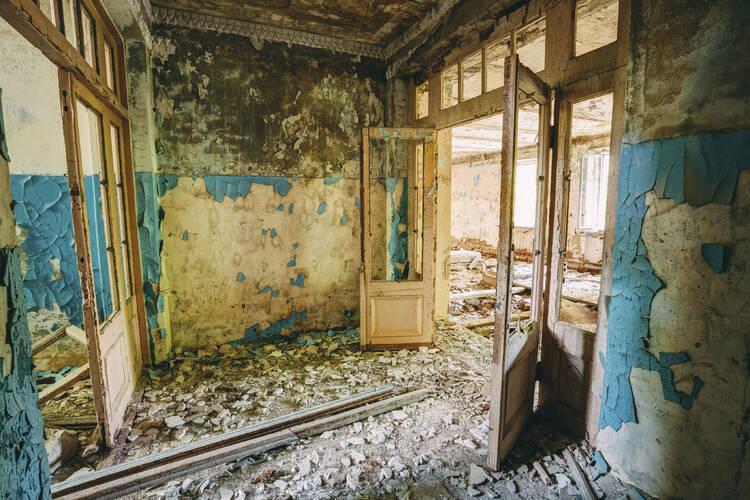The international anxiety and indignation ignited by the nuclear accident in the Ukraine would not have surprised the late Marshall McLuhan. That verbal and emotional fallout was only another demonstration that the world, as McLuhan said a quarter of a century ago, has shrunk to the size of a global village in which the misfortune of one household is bound to shake up all the others. Vatican II’s Constitution on the Church in the Modern World made the same point less colorfully in 1965: “Through the development of the many means of communication among nations, the human family is coming to see itself, and establish itself, as a single worldwide community.”
The accident at the Chernobyl nuclear power station reminded the nations that their embryonic community will be more quickly and safely matured if it is made up of open rather than closed societies. U.S. Government experts judge the Soviet reactor accident to have been the worst in the 29-year history of such disasters, but in making that estimate they received almost no help from Moscow. On April 30, several days after the plant is believed to have caught fire, Soviet authorities laconically reported: “The reactor is in a smothered state.” They could not have said the same about the universal alarm set off by the damage to the power plant and the release of dangerous quantities of radiation.
Soviet leaders complained that a flow of spectacular misinformation created anti-Soviet hysteria, but they had only themselves to blame for this. If the reactions from abroad really surprised them, that is disturbing evidence of how little they understand the world beyond their borders. They were criticized largely because they refused to share details about the accident either with their own citizens or with their neighbors.
No doubt, that secrecy was partly due to the instinctive inclination to cover up that marks officialdom everywhere. For several days after the U. S. nuclear accident at Three Mile Island in March 1979, the Nuclear Regulatory Commission issued only partial and misleading reports. But the facts were gradually disclosed because the press and Pennsylvania state authorities focused megawatt spotlights of attention on the Three Mile Island event. By keeping their own citizens uninformed about the Chernobyl accident, the Soviet leaders showed that “democratic socialism” lacks democracy’s essential quality—the reasonable participation of the “demos,” the people, in public affairs.
Besides confirming the truth that open societies, despite their faults, have political forms that are morally superior to those of closed societies, the Soviet reactor accident also reinforced doubts about nuclear technology itself. According to a recent U.S. Government report, 25 nations had nuclear power plants in operation as of June 30,1984, and 10 others had plants on order. Since none of these can claim absolute immunity from the possibility of accident—even the most secure might be jostled by an earthquake—the scientists and environmentalists who lead the antinuclear movement want all such installations phased out. This will not happen in a country like France, which derives 64.8 percent of its electricity from nuclear power, but it is feasible in the United States, which depends on nuclear energy for only 16 percent of its electricity.
To the examination of the issue of nuclear energy, Christians should not bring a fixed distrust of scientific technology. As the Vatican II document quoted above says: “Those who believe in God take it for granted that, taken by itself, man’s activity, both individual and collective—that great struggle in which men in the course of ages have sought to improve the conditions of human living—is in keeping with God’s purpose.”
But one cannot deduce from this general principle whether the benefits of nuclear power outweigh its risks. Hard questions of fact and judgment remain to be resolved. For instance, defenders of nuclear energy have said it is unlikely that nuclear reactors would ever be diverted into the production of nuclear weapons. Yet an article last month in the (London) Tablet noted that between 1964 and 1969, one British plant was indeed transferring plutonium from the civil to the military stockpile.
In an age when coal and oil reserves are diminishing, the strongest argument for nuclear power is that it will provide an abundance of cheap energy for the poorer nations. Those nations, however, cannot afford adequate safeguards for nuclear plants without raising energy prices. It is certain, as Pope Pius XII said, that “the church loves and favors human progress.” What remain uncertain are the precise conditions under which nuclear energy will promote rather than threaten that progress.








